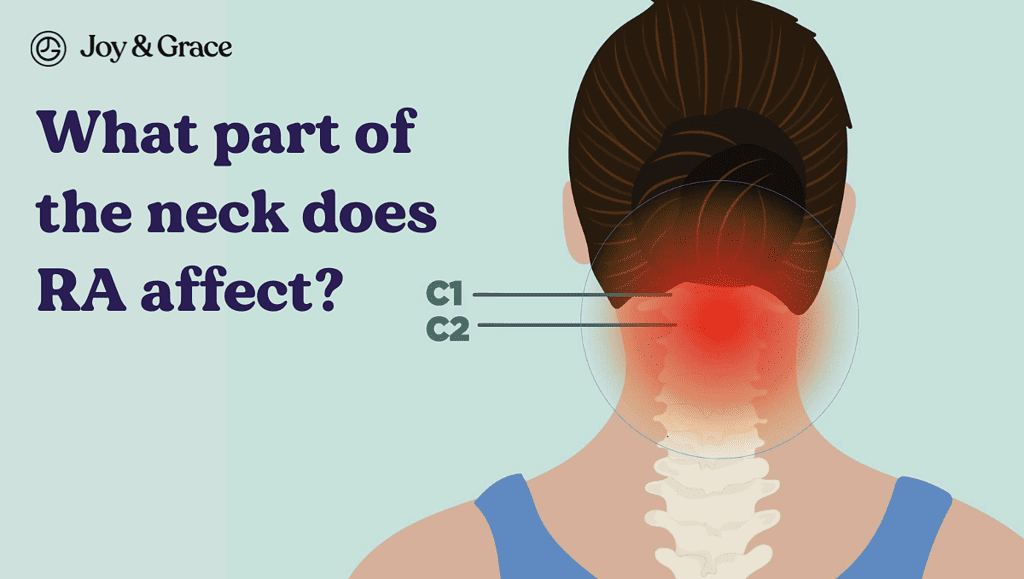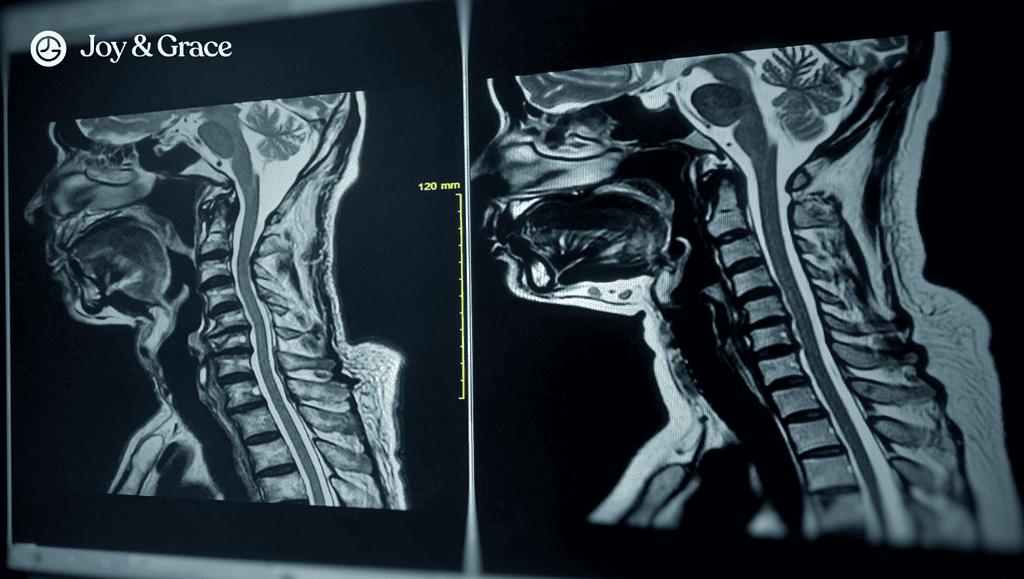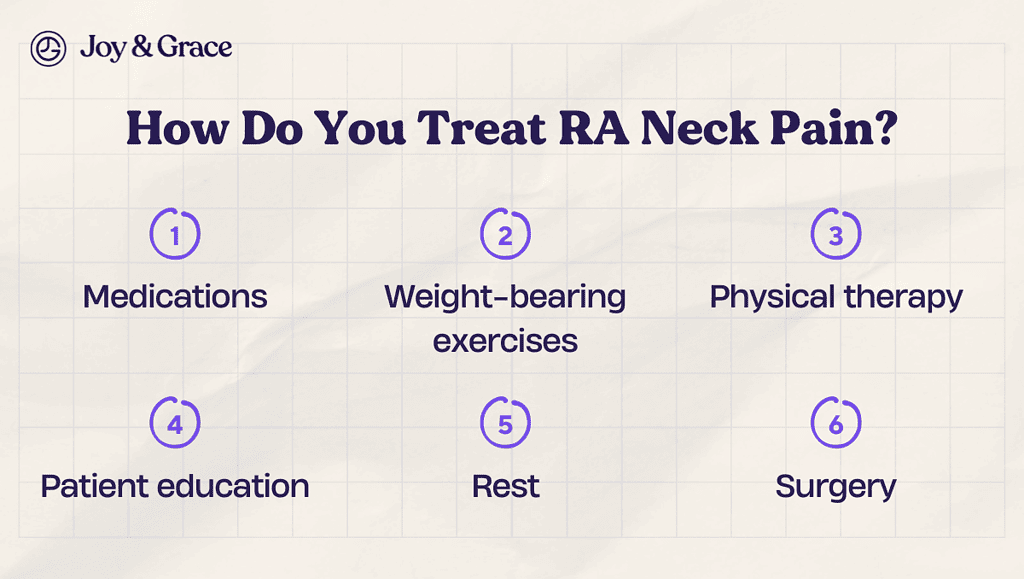Neck pain can be one of the most debilitating symptoms of rheumatoid arthritis (RA), but it is often misdiagnosed and misunderstood. The good news is that neck pain is treatable, even if no other symptoms exist.
This post aims to discuss the following:
- What causes Rheumatoid Arthritis neck pain
- How to recognize the symptoms
- How physicians evaluate your neck pain (if it's caused by RA or something else)
We'll also explain what treatments are available for RA-related neck pain and offer tips on managing your condition at home.
Can Rheumatoid Arthritis Cause Neck Pain?
Yes, rheumatoid arthritis can cause neck pain.
It's not uncommon for patients with RA to experience pain in their neck, spine, and other areas of the body.
According to a 2011 study, cervical spine (neck) involvement is common in RA and can present with various symptoms, including neck pain. Other studies also support this, confirming that cervical spine involvement is a common component of RA.
The most common symptom associated with rheumatoid arthritis (RA) is joint inflammation. People with RA may have swelling in their joints, like in their fingers, and feel stiff when they wake up in the morning. These symptoms may last until the late afternoon when normal activities like work and school make people more active again.
What Are the First Signs of Arthritis in the Neck?

The first signs of arthritis in the neck can be:
- Neck pain: The initial sign of arthritis in the neck is often persistent pain or stiffness in the neck region. This pain can range from mild to severe and may worsen with movement or prolonged periods of inactivity. Symptoms are often more pronounced in the morning.
- Stiffness: Arthritis in the neck can reduce the ability to move the neck freely. You may notice difficulty turning your head from side to side or tilting it backward or forward.
- Headaches: Arthritic changes in the neck can cause tension headaches that originate from the neck and radiate to the back of the head or temples.
- Grinding or popping sounds: Arthritis can wear down the cartilage in the neck joints, which can make the neck feel like it is grinding or popping when it moves.
However, it’s also important to note that it is very rare to have cervical involvement in the initial period of RA. People usually notice that other areas of their body are affected first. For example, symptoms such as your joints swelling or being stiffer than usual.
Yet, sole neck involvement in RA isn’t impossible. This is supported by a case review stating that isolated neck pain without other manifestations in the distal joints may occur in very rare cases.
What Does RA Pain Feel Like in the Neck?
There are many ways to describe what rheumatoid arthritis (RA) pain feels like, such as:
- Aching pain: Many individuals with RA in the neck describe a deep, dull, or achy pain. This type of pain may be persistent and can range in intensity from mild to severe. It may feel like a constant discomfort in the neck region.
- Sharp or shooting: In some cases, RA-related neck pain may be characterized by sharp or shooting pain sensations. When the neck moves or is in a certain position, these sharp, quick pains can start and sometimes spread to the shoulders or arms.
- Burning or throbbing: Some individuals may experience a burning or throbbing sensation in the neck affected by RA. This type of pain can be accompanied by warmth or a pulsating feeling in the neck region.
- Tension or stiffness: RA in the neck can lead to a sensation of tension or stiffness. The neck muscles may feel tight, and there may be a persistent feeling of restricted movement or limited range of motion.
What Are the Symptoms of Severe Arthritis in the Neck?
Symptoms of severe arthritis in the neck include:
- Chronic, intense neck pain
- Severely limited range of motion
- Difficulty in performing daily activities
- Numbness or tingling in the arms or hands
- Weakness in the neck muscles
- Swelling and tenderness in the neck joints
Arthritis needs to be treated correctly because, if left unchecked, it can cause spinal cord compression in the neck area (such as in this case of a 60-year-old woman with untreated rheumatoid arthritis).
If the compression is severe, a dangerous condition called cervical myelopathy can arise. It is estimated that it occurs in 2.5% of patients with rheumatoid arthritis and can present with symptoms such as:
- Difficulty walking or maintaining balance
- Loss of bladder or bowel control
- Weakness or paralysis in the arms or legs
- Numbness or loss of sensation in the arms, hands, legs, or feet
- Problems with coordination and fine motor skills
These major signs show how important it is to treat and take care of arthritis right away to keep nerve function and avoid complications.
Can Reactive Arthritis Affect the Neck?
Reactive arthritis is applied to all cases of arthritis that are caused by an illness, and it usually affects the knees, ankles, and feet. While it is less common for reactive arthritis to target the neck joints specifically, it is not entirely unheard of.
For example, a case study of a 6-year-old who had been having neck pain for a week was found to have reactive arthritis that was only in the neck.
Still, the likelihood of reactive arthritis affecting the neck is relatively low compared to other joints.
What Part of the Neck Does RA Affect?

Rheumatoid arthritis mostly affects the first and second vertebrae in the neck.
This can cause various symptoms, depending on which surrounding neck structures are involved.
For example, rheumatoid arthritis can cause problems in the neck by putting pressure on the spinal nerve roots, which can lead to muscle loss in that area. That can lead to difficulty moving your head, experiencing pain when turning it from side to side or up and down, and limited range of motion. Other neurological symptoms may also be present.
The neck (cervical spine) is the second most common site of rheumatoid arthritis. It ranks after small peripheral joints (the smaller joints in the body, especially those in the hands, wrists, feet, and legs).
How Do You Know If You Have Rheumatoid Arthritis in the Neck?

If you suspect you have rheumatoid arthritis in the neck or you have other manifestations as well, like: painful joints on the hand and foot, stiffness upon waking up in the morning, redness (inflamed joints), and tenderness on affected joints, a doctor can help you in the diagnosis by:
- Obtaining a careful review of your history
- Doing a thorough physical exam
- Request blood tests that will rule out or support the diagnosis
According to a review, approximately 33 to 50% of patients with rheumatoid arthritis don’t present with neck symptoms. Therefore, as mentioned, it is crucial for doctors to carefully evaluate and take patient history in the setting of rheumatoid arthritis in the neck because of the many factors that can confound the manifestations, according to research.
Can Arthritis in the Neck Cause Other Problems?

Other symptoms of rheumatoid arthritis (RA) in the neck can include:
- Fatigue: Pain and inflammation caused by RA can make it hard to get enough rest and make you feel tired all the time.
- Mental health problems: Chronic neck pain and stiffness caused by arthritis can greatly affect mental health. Constant pain, limited mobility, and the difficulty of doing daily tasks can all lead to frustration, worry, stress, and depression. For both the physical and mental effects of arthritis in the neck, it is important to get the right help and care.
- Impact on sleep: Neck pain from arthritis can interfere with sleep quality and lead to sleep disturbances. Restful sleep is essential for overall health and well-being, and addressing neck pain can help improve sleep patterns.
- Degenerative changes: Over time, arthritis can cause the joints in the neck to wear out, which can lead to bone spurs and other joint problems. These changes can further restrict mobility and increase discomfort.
- Dizziness or vertigo: Rarely, RA in the neck can make the cervical spine less stable, which can make you feel dizzy or like you're spinning (vertigo).
Can Arthritis in the Neck Cause Paralysis?
Arthritis in the neck does not directly cause paralysis.
However, serious neck arthritis can cause spinal cord compression and cervical myelopathy. This is if the structures around the spinal cord get smaller and put pressure on it. The compression can result in neurological symptoms such as:
- Weakness
- Numbness
- Coordination difficulties in the arms and legs
If left untreated, spinal cord compression can lead to progressive neurological deficits, but it is important to note that paralysis is a rare outcome. If you have neck arthritis, you need to see a doctor right away. Getting proper medical attention is crucial to deal with your symptoms and avoid complications.
What Happens if Arthritis in Neck is Left Untreated?
If arthritis is left untreated, it can result in complications, as we mentioned earlier.
Pain and stiffness in the joints can worsen over time, making it harder to do everyday things. As the disease progresses, there may be a noticeable decline in the ability to perform routine tasks. Also, RA can cause nerve compression, which can cause symptoms like muscle loss, numbness, or a burning feeling if it is not handled.
Finally, the bone spurs caused by the disease can cause the spinal canals to narrow. This condition is known as spinal stenosis.
The central spinal canal can also be involved if the narrowing is severe. Since the spinal cord is in the central canal of the spine, a severe narrowing can cause cervical myelopathy, which we talked about a few lines ago.
What Should You Not Do if You Have Neck Arthritis?
Rheumatoid arthritis is strongly linked to genes, so it can't be completely avoided. However, there are things you should not do if you have this condition, such as:
- Smoking. Don't smoke or be around people who do. Smoking has been linked to more inflammation and can speed up joint damage in people with arthritis.
- Not eating a balanced diet. Neglecting a balanced diet can deprive your body of essential nutrients needed for joint health. Avoid excessive consumption of processed foods, sugary snacks, and unhealthy fats.
- Not exercising. Avoid being too lazy and do the regular, low-impact workouts your doctor or nurse has suggested. Not exercising can lead to muscle weakness, reduced joint flexibility, and increased pain and stiffness.
- Not maintaining ideal body weight. Excess weight can put additional strain on the neck joints, worsening symptoms of arthritis. Strive to maintain a healthy body weight through a balanced diet and regular exercise.
- Moving your neck too much or over and over again. Limit activities that require you to move your neck too much or repeatedly, as they can strain joints that are already damaged.
- Ignoring the pain. Ignoring or trying to push through severe neck pain can make it worse. Pay attention to your body and get the rest and care it needs when it does something wrong.
- Having bad posture. Keeping good posture to reduce stress on the neck joints is important. Don't slouch or hunch over, especially when sitting for a long time or using a computer.
- Engaging in high-impact activities. Too much pressure can be put on the neck joints by high-impact activities like contact sports or activities with quick, jarring moves. Choose exercises and activities that are easy on the neck and don't stress it much.
- Putting heavy things on your head or shoulders. Putting heavy things on your head or shoulders can hurt your neck joints. Choose other ways to carry or spread out the weight, like using a backpack or proper lifting techniques.
- Excessively self-medicating. Over-the-counter pain relievers can help briefly, but you should only rely on them a little. Talk to a doctor or nurse about the right medicines and ways to deal with the pain.
- Being inactive for too long. Being inactive for too long can cause stiff joints and muscle weakness. Do gentle stretching and movement exercises daily to keep your neck muscles flexible and strong.
Which Test is Highly Specific for Rheumatoid Arthritis?
According to research, the anti-CCP test (anti-cyclic citrullinated peptide) is the most accurate test for rheumatoid arthritis, with a sensitivity of about 96%. However, during the early stages, patients may not have a positive result with this test, so having a negative result does not rule out RA.
Does MRI Show Arthritis in Neck?

Yes, arthritis in the neck does show on an MRI. Magnetic resonance imaging (MRI) is an imaging instrument that can evaluate inflammation in joints, tendons, and bones. It is very useful in patients with rheumatoid arthritis (RA) to detect inflammation and assess its severity. MRIs can also help track how the disease is worsening and how well the treatment works. They can also help find early signs of inflammation and any problems with RA.
How Do You Treat RA Neck Pain?

In general, the main goals of the treatment of RA are to reduce joint pain and swelling, improve joint function, and stop joint damage and malformation. Treatment regimens include a combination of the following:
- Medications (NSAIDs and corticosteroids). Corticosteroids and nonsteroidal anti-inflammatory drugs (NSAIDs) are used to reduce pain and inflammation in the neck joints.
- Weight-bearing exercises and physical therapy to maintain joint function and strengthen the muscles around the joint. Examples of weight-bearing exercises include swimming, yoga, and tai-chi.
- Patient education. Patients can learn about RA and how to treat it through patient education programs. This gives them the power to actively participate in their treatment plan and make smart choices.
- Rest. Proper rest and pacing activities can help manage symptoms and prevent overexertion.
- Surgery (as a last resort, especially after all non-surgical efforts have been exhausted)
Does a Rheumatologist Treat Neck Pain?
Yes, rheumatologists can treat neck pain arising from rheumatic conditions. These are doctors who specialize in the diagnosis, treatment, and management of several disorders:
- Inflammatory or rheumatic disorders (affecting the joints, bones, and muscles)
- Connective tissue diseases (affecting ligaments and tendons)
- Autoimmune disorders (when the immune system fails to recognize healthy tissues and attack them)
What is the Best Medicine for Neck Arthritis?
The first line of medical treatment for rheumatoid arthritis includes NSAIDs and corticosteroids.
Examples of NSAIDs (fast-acting) are the following:
- Aspirin (acetylsalicylate)
- Naprosyn (naproxen)
- Advil or Motrin (ibuprofen)
- Lodine (etodolac)
On the other hand, corticosteroids are more potent. But have side effects, which makes these drugs more recommended at a low dosage and during RA flares. Injection of corticosteroid directly into the joint can be done for relief of localized symptoms.
There are also disease-modifying antirheumatic drugs (DMARDs), which act as immunosuppressants. These drugs help calm the body's overly active defense and inflammation systems. However, they take a few weeks or months to start working and don't provide quick relief from symptoms.
Examples of DMARDs are the following:
- Methotrexate
- Sulfasalazine
- Hydroxychloroquine
- Leflunomide
- Azathioprine
Takeaway
Neck pain can be a debilitating symptom of rheumatoid arthritis (RA), often overlooked and misunderstood. But for a correct evaluation and good treatment, it's important to know how RA and neck pain are related.
RA can cause neck pain, and cervical spine involvement is common in RA patients. Pain that doesn't go away, stiffness, headaches, and grinding or popping sounds are some of the first signs of arthritis in the neck. Severe arthritis in the neck can lead to limited mobility, chronic inflammation pain, and even spinal cord compression if left untreated. Timely treatment and management are essential to prevent complications and preserve neurological function.
Careful evaluation of the patient's medical history, a physical check, and blood tests are necessary. If you ignore neck arthritis or don't take care of it, it can get worse. Neglecting the disease increases the risk of problems like spinal stenosis and cervical myelopathy, though paralysis is rare.















